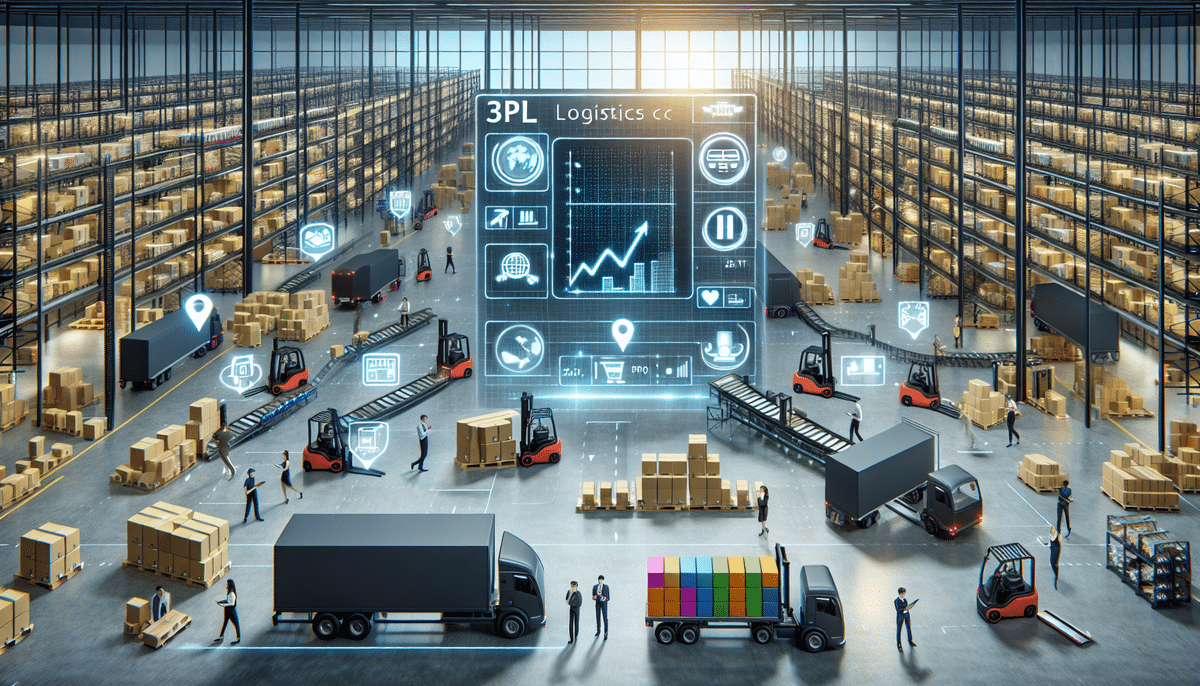An Overview and Features of 3PL Logistics Fulfillment Companies
In today's fast-paced and highly competitive business environment, outsourcing has emerged as a strategic approach for companies aiming to optimize operations and enhance efficiency. A significant area benefiting from this trend is logistics and fulfillment, with a growing number of businesses opting to partner with third-party logistics (3PL) providers. This article offers an in-depth analysis of 3PL logistics fulfillment companies, exploring their benefits, challenges, key features, and the emerging trends shaping the industry's future.
Why 3PL Logistics Fulfillment Companies are Gaining Popularity
The logistics industry is inherently complex and continuously evolving, making in-house management a formidable challenge, especially for e-commerce businesses that demand swift and seamless product delivery. According to a report by Business News Daily, outsourcing to a 3PL logistics company offers a myriad of services, including transportation, warehousing, distribution, and inventory management. This strategic move allows businesses to concentrate on their core competencies, reduce operating costs, and enhance overall efficiency.
Additionally, 3PL logistics providers offer significant scalability. As businesses expand, their logistics requirements evolve, and a 3PL partner can seamlessly adjust services to meet these changing needs. This flexibility enables businesses to grow without the logistical hassles typically associated with expansion. Furthermore, 3PL providers leverage advanced technologies and industry expertise that may be unavailable in-house, leading to improved supply chain visibility and more informed decision-making.
- Cost Savings: Reduces the need for capital investment in logistics infrastructure.
- Scalability: Easily adjusts services to match business growth.
- Access to Technology: Utilizes advanced systems for better supply chain management.
- Expertise: Benefits from the provider's industry knowledge and best practices.
Understanding the Role of 3PL Logistics in E-commerce Business
E-commerce businesses face unique logistical challenges, from order processing and inventory management to shipping and returns. An experienced 3PL logistics provider can streamline these processes, ensuring a seamless customer experience and boosting operational efficiency.
One of the primary advantages of partnering with a 3PL provider is the ability to scale operations rapidly. As demand fluctuates, especially during peak seasons, a 3PL can adjust resources accordingly, ensuring consistent service levels without the need for businesses to hire additional staff or invest in new infrastructure.
Moreover, 3PL providers offer access to sophisticated technology and analytics tools. These technologies facilitate optimized supply chain operations, cost reduction, and enhanced efficiency. With real-time data insights, businesses can make strategic decisions regarding inventory management, shipping routes, and more, ultimately enhancing the customer experience and driving growth.
"Businesses that leverage 3PL services can achieve up to a 20% reduction in operational costs while improving delivery times." – Gartner Supply Chain Report 2023
Benefits of Outsourcing Fulfillment to 3PL Logistics Companies
Outsourcing fulfillment to 3PL logistics companies offers numerous advantages:
- Cost Efficiency: Reduces expenses related to warehousing, labor, and technology.
- Risk Mitigation: Minimizes risks associated with inventory management and logistics operations.
- Enhanced Scalability: Adapts to varying business sizes and seasonal demands.
- Access to Advanced Technology: Utilizes state-of-the-art systems for inventory and order management.
- Expert Knowledge: Leverages the provider's industry expertise and best practices.
Additionally, outsourcing allows businesses to enter new markets more easily, improve delivery times, and manage inventory more effectively by taking advantage of the provider's economies of scale.
By delegating logistics and fulfillment tasks to a third-party provider, businesses can focus on their core activities such as product development, marketing, and customer service. This focus can lead to increased productivity, efficiency, and profitability. Moreover, outsourcing enables businesses to stay competitive in a rapidly changing marketplace by allowing them to swiftly adapt to new trends and customer demands.
Key Features of a Reliable and Efficient 3PL Logistics Provider
When selecting a 3PL logistics provider, it's crucial to evaluate several key features to ensure reliability and efficiency:
- Reliability: Consistently delivers accurate and timely order fulfillment.
- Experience: Possesses extensive industry knowledge and a proven track record.
- Scalability: Can expand services to accommodate business growth.
- Flexibility: Adapts to changing business needs and market conditions.
- Effective Communication: Maintains open and transparent communication channels.
- Advanced Technology: Utilizes cutting-edge systems for inventory and order management.
- Exceptional Customer Service: Provides responsive and supportive client interactions.
Moreover, sustainability is becoming increasingly important. A top-tier 3PL provider should demonstrate a commitment to reducing their carbon footprint through eco-friendly practices, such as using electric or hybrid vehicles, implementing recycling programs in warehouses, and utilizing energy-efficient lighting and equipment. Partnering with a sustainable 3PL provider not only enhances supply chain operations but also contributes to a greener future.
How 3PL Logistics Companies Help Businesses Improve Customer Experience
In the age of e-commerce and heightened delivery expectations, customer experience is paramount to business success. 3PL logistics providers enhance customer experience in several ways:
- Timely Deliveries: Ensures products reach customers promptly and reliably.
- Accurate Order Fulfillment: Minimizes errors in orders, reducing returns and increasing satisfaction.
- Efficient Returns Management: Streamlines the return process, enhancing customer trust.
- Customized Solutions: Tailors logistics services to meet specific business and customer needs.
By managing order fulfillment, returns, and customer service, 3PL companies help businesses boost customer satisfaction and loyalty, ultimately driving repeat business. Additionally, by offering tailored logistics solutions, 3PL providers enable businesses to differentiate themselves in a crowded market, providing a competitive edge.
Furthermore, 3PL logistics companies contribute to sustainability efforts, which can positively influence customer perceptions. Implementing eco-friendly practices such as reducing packaging waste, optimizing transportation routes, and utilizing energy-efficient facilities helps businesses appeal to environmentally conscious consumers, fostering increased loyalty and a positive brand image.
Choosing the Right 3PL Logistics Partner for Your Business Needs
Selecting the appropriate 3PL logistics partner is crucial for aligning with your business objectives. Consider the following factors:
- Industry Experience: Ensure the provider has expertise in your specific industry.
- Service Offerings: Verify that the provider offers the necessary services to meet your needs.
- Technology Integration: Assess the provider's technological capabilities and compatibility with your systems.
- Pricing Structure: Understand the pricing model and ensure it aligns with your budget.
- Customer Service: Evaluate the provider's responsiveness and support quality.
Additionally, it's important to consider the provider's ability to handle your specific product requirements. For instance, businesses dealing with perishable goods require a partner experienced in temperature-controlled logistics, while those handling hazardous materials need a provider adept at safe and compliant transportation. Ensure that your 3PL partner holds the necessary certifications and licenses, and adheres to industry best practices to mitigate risks related to damage or loss.
Top Trends Shaping the Future of 3PL Logistics and Fulfillment Industry
The logistics and fulfillment industry is rapidly transforming, influenced by several key trends:
- Automation and Robotics: Increased use of automated systems and robotics in warehouse operations to enhance efficiency and accuracy.
- Real-Time Tracking and Analytics: Leveraging real-time data and analytics to optimize supply chain operations and improve decision-making.
- Sustainable Practices: Adoption of eco-friendly logistics practices to reduce environmental impact.
- Advanced Technologies: Integration of artificial intelligence (AI) and blockchain to enhance transparency and security in the supply chain.
- E-commerce Growth: Rising demand for fast and efficient delivery services, including same-day and next-day delivery options.
- Innovative Delivery Models: Utilization of drones and autonomous vehicles for last-mile delivery to meet consumer expectations for speed.
- Digital Transformation: Accelerated adoption of digital platforms and tools in response to the COVID-19 pandemic, enabling contactless delivery and online ordering systems.
These trends are reshaping the 3PL logistics and fulfillment landscape, driving companies to innovate and adapt to meet evolving customer demands and market conditions.
Cost Comparison: In-house Fulfillment vs Outsourcing to a 3PL Logistics Company
Cost considerations play a pivotal role in the decision to manage fulfillment in-house or outsource to a 3PL logistics company. In-house fulfillment often entails substantial capital investments in equipment, software, labor, and real estate to maintain operations. Conversely, outsourcing to a 3PL provider can yield significant cost savings by eliminating the need for these investments.
Outsourcing also offers greater flexibility and scalability, allowing businesses to adjust resources based on demand without bearing the full financial burden. Additionally, 3PL providers bring advanced technology and expertise, further enhancing cost efficiency by optimizing processes and reducing waste.
| In-house Fulfillment | Outsourcing to 3PL |
|---|---|
| High initial capital investment | Lower upfront costs |
| Requires hiring and training staff | Access to skilled logistics professionals |
| Ownership of logistics infrastructure | No need for owning warehousing and transportation assets |
| Less flexibility in scaling operations | Easily scalable to match business growth |
| Direct control over fulfillment processes | Leverages 3PL's expertise and technology |
Best Practices for Working with a 3PL Logistics Partner to Optimize Your Supply Chain
Effective collaboration with a 3PL logistics partner is essential to optimize your supply chain. Implement the following best practices:
- Clear Communication: Establish open and transparent communication channels to ensure alignment on expectations and objectives.
- Define Roles and Responsibilities: Clearly outline the roles and responsibilities of both parties to avoid misunderstandings.
- Set Measurable Goals: Develop specific, measurable goals to track performance and ensure accountability.
- Leverage Technology: Utilize integrated technologies to enhance visibility and streamline operations.
- Regular Performance Reviews: Conduct periodic evaluations of performance metrics to identify areas for improvement.
- Foster Partnership: Cultivate a collaborative relationship built on trust and mutual respect.
By adhering to these practices, businesses can maximize the benefits of their partnership with a 3PL provider, ensuring a more efficient and resilient supply chain.
How to Evaluate and Measure the Performance of Your 3PL Logistics Provider
To maintain a competitive edge, it is imperative to regularly assess the performance of your 3PL logistics provider. Key performance indicators (KPIs) to consider include:
- On-Time Delivery Rates: Measures the percentage of orders delivered on schedule.
- Order Accuracy: Evaluates the correctness of fulfilled orders.
- Inventory Accuracy: Assesses the precision of inventory levels maintained by the 3PL.
- Customer Satisfaction: Gauges the overall satisfaction of end customers with the fulfillment process.
- Return Processing Efficiency: Measures the effectiveness of handling returns and exchanges.
- Cost Efficiency: Analyzes the cost-effectiveness of the 3PL services provided.
Consistently gathering and analyzing reliable data on these metrics enables businesses to make informed decisions, identify improvement opportunities, and ensure that the 3PL provider meets or exceeds performance expectations.
Common Challenges Faced by Businesses When Working with a 3PL Provider and How to Overcome Them
While partnering with a 3PL provider offers numerous benefits, businesses may encounter certain challenges, including:
- Communication Breakdowns: Misunderstandings or lack of clear communication can lead to errors and inefficiencies.
- Insufficient Inventory Management: Inaccurate inventory tracking can result in stockouts or excess inventory.
- Lack of Visibility: Limited insight into the 3PL's operations can hinder decision-making.
To overcome these challenges, businesses should:
- Establish Clear Communication Protocols: Define regular communication schedules and channels to ensure consistent information flow.
- Implement Robust Inventory Systems: Utilize integrated inventory management systems to maintain accurate stock levels.
- Enhance Transparency: Use technology solutions that provide real-time visibility into logistics operations.
- Collaborate Closely: Foster a collaborative relationship with the 3PL provider to address issues proactively.
- Regularly Review Performance Metrics: Monitor KPIs and provide actionable feedback to ensure continuous improvement.
By addressing these challenges with strategic measures, businesses can optimize their partnership with 3PL providers and achieve their logistics objectives effectively.
Case Studies: Success Stories of Businesses that have Partnered with a 3PL Logistics Company
Numerous businesses have achieved significant success by partnering with 3PL logistics companies:
- E-commerce Expansion: A rapidly growing e-commerce company partnered with a 3PL provider to manage its warehousing and fulfillment operations. This collaboration enabled the business to scale efficiently, enhance customer experience, and ultimately increase sales and profitability.
- Global Manufacturing Efficiency: A global manufacturer collaborated with a 3PL logistics provider to streamline its supply chain. This partnership led to reduced lead times, lower costs, and improved supply chain efficiencies across multiple regions.
- Startup Market Entry: A startup entering the retail market utilized a 3PL provider to handle its logistics and fulfillment needs. This allowed the startup to focus on product development and marketing while leveraging the provider's expertise to ensure reliable delivery and inventory management.
These case studies demonstrate the tangible benefits that businesses can reap by strategically partnering with 3PL logistics companies.
Questions to Ask When Selecting a 3PL Provider for Your Business
Choosing the right 3PL provider is a critical decision that can significantly impact your business operations. To make an informed choice, consider asking the following questions:
- What Services Do You Offer? Understand the range of services provided and ensure they align with your business needs.
- What Technologies Do You Utilize? Inquire about the technology platforms and systems the provider uses for inventory and order management.
- What is Your Industry Experience? Assess the provider's experience within your specific industry to gauge their expertise.
- How is Your Pricing Structured? Clarify the pricing model to ensure it fits within your budget and offers cost transparency.
- What Level of Customer Service Do You Provide? Evaluate the quality and responsiveness of the provider's customer support.
- Can You Handle My Specific Product Requirements? Confirm the provider's capability to manage any unique aspects of your products, such as perishability or hazardous materials.
- What Are Your Sustainability Practices? Inquire about the provider's commitment to sustainability and eco-friendly practices.
- Do You Have References or Case Studies? Request testimonials or case studies to understand the provider's track record and client satisfaction.
These questions will help ensure that you select a 3PL provider that is well-suited to meet your business needs and support your growth objectives.
Conclusion: Why Outsourcing to a Reliable and Experienced 3PL Provider is Key for Your Business Success
Outsourcing to a reliable and experienced 3PL logistics provider can be transformative for businesses aiming to optimize operations, reduce costs, and enhance customer experience. By delegating logistics functions such as transportation, warehousing, and fulfillment to a trusted partner, businesses can concentrate on their core activities and scale more efficiently.
Furthermore, 3PL providers bring valuable expertise, advanced technology, and a robust network that can help businesses navigate the complexities of the logistics industry. This partnership not only drives operational efficiencies but also fosters business growth and success in an increasingly competitive marketplace.
Investing in a strong relationship with a dependable 3PL provider is, therefore, a strategic move that can yield substantial long-term benefits, positioning your business for sustained success.
For more insights on 3PL logistics and fulfillment, explore comprehensive guides and reports from industry leaders such as CSCMP and Gartner.






















